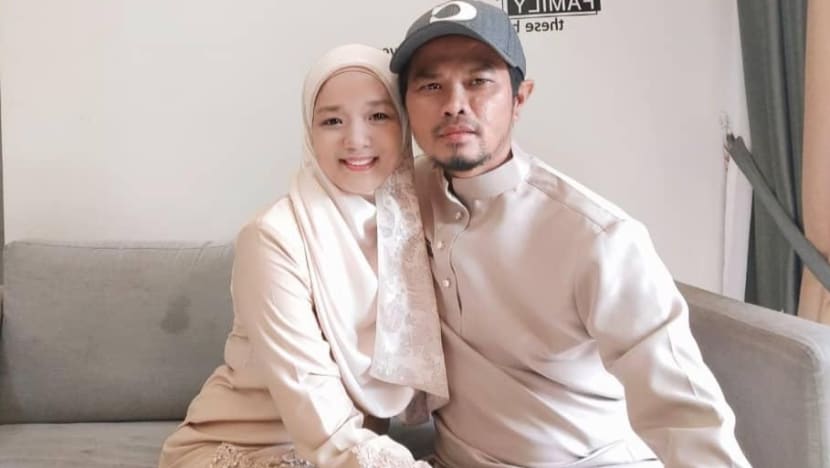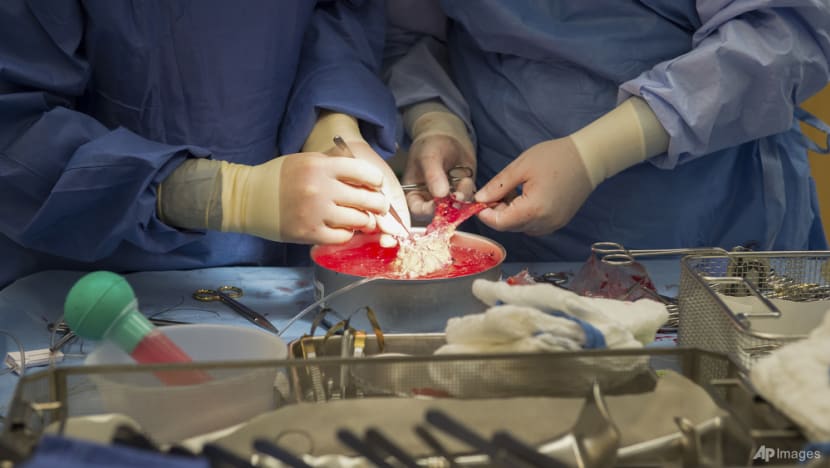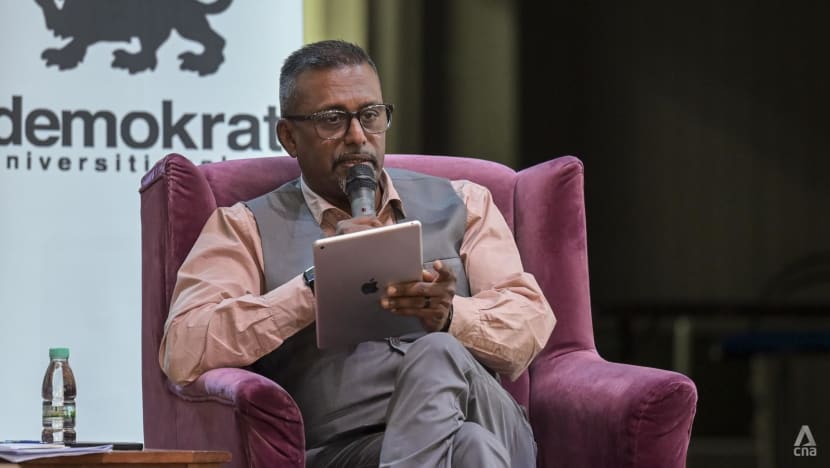Why does Malaysia grapple with low organ donation rate despite long transplant waitlist?
Notwithstanding a marginal increase in organ transplant rates over the past two years, Malaysia must undertake considerable efforts to enhance these numbers, says one expert.

Mashita Ramli and her late husband Sipen Mat Nur. Mashita had agreed for hospital authorities to harvest her late husband's organs after his death. (Photo: Mashita Ramli)

This audio is generated by an AI tool.
KUALA LUMPUR: On the last day of 2022, Mashita Ramli’s world shattered. Her husband, healthy just a day before, had inexplicably slipped into a coma.
After a couple of tests that were conducted over a period of over two days at the Selayang Hospital in Malaysia’s Selangor state, Sipen Mat Nur was declared brain dead.
Despite her husband’s condition, his kidneys, lungs, and corneas remained viable.
Doctors at the hospital then asked Mashita if she would consider donating her husband’s organs. Without hesitation, the 43-year-old agreed.
This even though she knew little about the donation process. Nor was her husband ever registered as an organ donor. But Mashita knew that she was making the right decision.
“My late husband was somebody who used to give freely,” she told CNA.
“So, even though I was overcome with sadness, I knew that by donating his organs, someone else could have a chance at a better life. The organs were no longer of use to him and would have disintegrated in the earth. But if donated, they would have been useful to someone."
Mashita said there had been some hesitation from her in-laws at first, but they eventually agreed for their son’s organs to be donated.
Sipen's liver, heart, kidneys and corneas were harvested and transplanted into others who needed the organs desperately.
“At least, that was his last gift to the world, in death,” said Mashita, who continues the satay business she and her husband - who died at the age of 40 - had been conducting together.

To date, only 986 deceased donors have saved lives by donating their organs and tissues after death in Malaysia, according to statistics from the government's Derma (Donate) Organ website.
They contributed to a total of 3,106 organs and tissues donated since 1976.
“These figures prove that the actions of a single individual can change many lives. However, the numbers remain low, and much more needs to be done to raise public awareness about registering as organ donor pledgers,” the National Transplant Resource Centre (NTRC) director Mohd Syafiq Ismail Azman told state news agency Bernama recently.
“The organ donation rate in this country is still low compared to other nations.”
Compounding the issue is a decline in the number of people pledging to donate their organs in recent years.
Meanwhile, an expert whom CNA spoke to said that beyond the low organ donation rate in the country, Malaysia also grapples with manpower and infrastructure issues on this front.
LONG WAITLIST FOR REPRIEVE
According to statistics from the NTRC, more than 10,000 people are on the waitlist for organ donations.
As of February this year, kidney transplant patients make up the largest group, with 10,197 individuals - adults and children - on the list. This is followed by those requiring heart transplants (21), liver transplants (11), heart and lung transplants (eight), and three patients awaiting a lung transplant.
In 2015, there were more than 19,000 patients on the waiting list for a kidney, according to a report by the New Straits Times then.
The number of people on the organ transplant waiting list may have declined as compared to a decade ago, but this can be attributed to how the criteria to be added to the list have become more rigorous in recent years.
President of the Malaysian Society of Transplantation Zaimi Abdul Wahab said that while the waitlist for donations from deceased donors was once open to anyone aged between 18 and 60, they are now subjected to stricter selection.
"Previously, patients who had been on dialysis for 20 years would automatically move to the top of the transplant waiting list," he said.
"However, after analysing patient survival rates, we found our outcomes were less favourable compared to other countries. This led us to revise the system, as many of these long-term dialysis patients were older."
Zaimi said that a change in the allocation system for patients had resulted in a reduction in the number of people on the waiting list. But he stressed that this does not necessarily mean that there are fewer patients waiting for a kidney.
He said that currently all patients on dialysis - numbering about 50,000 - would be placed on the national renal registry.
Adults aged between 18 and 60 are eligible for a kidney transplant, with an Estimated Post Transplant Survival (EPTS) score used to determine how long one was likely to benefit from a transplant.
The score takes into account factors such as age and diabetes and the length of time a patient has been on dialysis. Candidates with a low EPTS, a score closer to zero, would likely have the longest time to benefit from a transplanted kidney.
“Their EPTS score will be calculated and those with EPTS less than 40 per cent only are considered to be eligible to receive a kidney from a deceased donor,” said Zaimi, adding that those below 18 are placed on a paediatric waiting list.
Those not on the waiting list can still get a kidney from a living donor.
The stricter criteria for the waiting list would mean more people needing to get donated kidneys from those who are alive, but there are no publicly available statistics on the size of this group, or how many succeed in getting such donations.
The shorter waiting list compared to the past also means that the waiting time for a deceased-donor kidney transplant in Malaysia has gone down.
The average wait used to be as long as 20 years. It is now about 10 to 15 years, said Zaimi, but he again stressed that looking at the larger picture, this is far from ideal.
“Even now we have over 10,000 people on the list for a kidney, but only 80 kidneys (available) a year. Many on the list would have passed on because there weren’t enough organs for donation,” he said.
Data from the International Registry in Organ Donation and Transplantation indicates that Malaysia has experienced variability in deceased donors, with a recent upward trend culminating in 43 donors in 2023.
Although there was an increase in the number of deceased donors in the past two years, Zaimi said it was still far from enough.
“The main limitation for now is that we don’t have enough kidneys for transplant and there is no point opening the list to everybody.”
He added that Malaysia's recent kidney transplant rate of 3 to 5 per million people (pmp) - both from live and deceased donors - lags significantly behind regional neighbours like Thailand (9 pmp) and Singapore (approximately 16 pmp), and is a small fraction of the rates seen in global leaders such as Spain (approximately 47-62 pmp).
Zaimi said that Malaysia’s kidney transplant rates remained among the lowest in the world, despite the country having one of the highest rates of end-stage kidney disease.
The high prevalence of diabetes has been cited as one of the main causes of kidney disease in Malaysia.
In 2021, Malaysia’s then-health director-general Noor Hisham Abdullah said that the number of Malaysians with kidney failure is expected to reach 106,000 by 2040.
LACK OF AWARENESS, KNOWLEDGE
Malaysia operates under an opt-in organ donation system, which, even with prior registration, requires consent from the next of kin for the donation to proceed.
“It is not uncommon that in the emotionally charged moments after a death, one relative’s objection can halt a potential donation, and hospitals have no legal means to proceed without unanimous family agreement,” said Zaimi.
In 2022, he said that around 550 potential donors who were brain dead had been identified for organ donations, but less than 70 next of kin of those patients agreed for their organs to be harvested.
“So, the conversion rate was only 13 per cent. If (the families of) all 550 (patients) agreed, we could have gotten about 1,000 kidneys, there would be less restrictions on who is placed on the waiting list,” said Zaimi.
He added there is a lack of awareness and knowledge about brain death and organ donation among both the public and even some healthcare workers, which further hampers donations made after patients have passed on.
This especially as traditional beliefs and religious concerns create reluctance to donate organs, said Zaimi.
“There's a strong cultural belief among some families that removing organs compromises the body's integrity needed for the afterlife,” he said, adding that no religion prohibited the donation of organs.
He added that some also hold onto superstitions - such as the notion that pledging to donate one’s organs may invite bad luck, or even the unfounded fear that a deceased person might feel pain during organ recovery.
At the same time, Zaimi said that Malaysia’s transplant capacity is constrained by resource and infrastructure issues: There are only two public hospitals in Malaysia that perform kidney transplants, both located in Kuala Lumpur.
He added that there were also only two dedicated kidney transplant surgeons serving the Ministry of Health hospitals nationwide.
“This limits the number of transplants we can physically perform, concentrates a huge burden on just a couple of individuals, and poses continuity risks. If one of these surgeons is unavailable or if the caseload increases, we face a bottleneck.
“The effectiveness of a transplant programme is only as good as the healthcare infrastructure supporting it,” he said.

Manvir Victor of Vital Signs - an organisation dedicated to the improvement of public health in Malaysia - pointed to the lack of will on the government's part for the low organ donation rates among the deceased.
Manvir who 13 years ago received a kidney from a living donor - his wife - attributed the low donation rate to insufficient support and advocacy for organ donation.
“Ask anyone you know if they even know how to opt in (for organ donations)?,” he told CNA.
In Malaysia, individuals can pledge to be an organ donor by registering online via the MySejahtera application, which was developed by the Malaysian government to manage the COVID-19 outbreak in the country.
After reaching a high of 51,715 pledges in 2022, it dropped to 28,344 in 2023 and further to 15,464 last year. The 2022 peak correlates with the launch of the MySejahtera app's digital donor pledge feature in September of that year.
“Basically, we have to reinvent how we do this. It’s 2025 but we are patting ourselves on the back when there are less than 200 transplants a year for a population of over 50,000 people that need it.
“We keep changing the criteria in order to exclude people, so we don't look bad,” said Manvir.
He suggested Malaysia tweak its policy to an “opt-out” system which many countries in the world practise, and took the United Kingdom five years to implement.
An opt-out system presumes consent for organ donation unless individuals register their refusal. The system still needs family consent before organ donations can take place.
Zaimi, the president of the Malaysian Society of Transplantation, said while the opt-out system may have the potential to increase organ donation rates like it did in the UK, Malaysia must first resolve issues of public awareness and cultural barriers prior to its adoption.
“It is clear that our healthcare system must adapt if we are to perform more transplants and improve outcomes,” he said.
SECOND CHANCE AT LIFE
Getting the “life-altering” gift of an organ transplant was a long time coming for Marina Mocktar.
The 42-year-old endured years of grueling dialysis after an 11-year battle with end-stage renal failure, a condition first diagnosed in 2009.
Her name, placed on the national waiting list in December 2017, finally yielded hope two years later and she underwent a transplant in January 2020.
“I was elated because, as everyone knows, the waiting list for a kidney in Malaysia is incredibly long, and I was chosen,” she told CNA.
The transplant transformed her life. No longer bound to a dialysis machine three times a week, Marina regained her freedom. Travel, once a distant dream, became a reality, allowing her to visit her hometown and enjoy holidays.
Even simple pleasures, like unrestricted eating and drinking, returned.
“When your kidneys fail, you can’t drink much because you don’t produce urine. The transplant changed everything,” she said.

Marina believes that more can be done when it comes to promoting organ donations in Malaysia.
At times, she tells CNA that she reflects on the unknown donor who gave her a second chance, and deeply wishes for the opportunity to express her gratitude.
“There's so much I would want to say, but for now, only an immense thank you from me to them. Only God can give a good reward to the deceased and their family," Marina said.
Mashita and her four children, meanwhile, are now all organ donors, seeing it as a powerful way to give someone another chance at life.
While privacy laws prevent her from knowing the recipients, she hopes they will remember her husband in their prayers.
“It doesn't matter their race or religion. I feel like a part of him is still here, his heart beating somewhere. If we can do good for others, blessings will follow," she said.




















